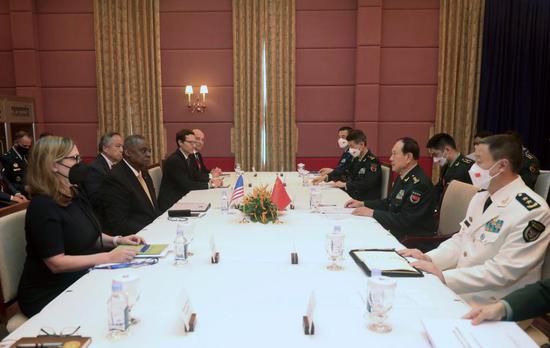
Chinese State Councilor and Defense Minister Wei Fenghe (2nd R, front), who is attending the ninth ASEAN Defense Ministers' Meeting-Plus in Cambodia, holds talks with U.S. Secretary of Defense Lloyd Austin (2nd L, front) at the latter's request in Cambodia on Nov. 22, 2022. (Photo by Li Xiaowei/Xinhua) Chinese State Councilor and Defense Minister Wei Fenghe, who is attending the ninth ASEAN Defense Ministers' Meeting-Plus in Cambodia, held talks with U.S. Secretary of Defense Lloyd Austin on Tuesday at the latter's request. Briefing Austin on the 20th National Congress of the Communist Party of China, Wei said that Chinese President Xi Jinping and U.S. President Joe Biden reached a series of important consensuses during their talks at the 17th Group of 20 Summit, charting the course for the development of China-U.S. relations. Wei said that the United States, not China, is responsible for the current situation in the China-U.S. relations. China attaches great importance to the development of relations between the two countries and the two militaries, but the U.S. side must respect China's core interests, the Chinese defense minister said. He expressed the hope that the United States could keep its words and promises, truly implement the consensuses reached by the two heads of state, and adopt rational and pragmatic policies towards China so as to push bilateral relations back to the track of healthy and stable development. Wei emphasized that the Taiwan question is the core of China's core interests and the first insurmountable red line in China-U.S. relations. He added that Taiwan is China's Taiwan, and the settlement of the Taiwan question is the Chinese people's own affair and brooks no foreign interference. Wei said the Chinese military has the backbone, confidence and ability to resolutely safeguard national unification. During the talks, the two sides voiced the view that the two militaries should earnestly implement the important consensuses reached by the two heads of state, maintain communication and contact, strengthen crisis management and control, and strive to maintain regional security and stability. The two sides also compared notes on the international and regional situation, and on issues including the Ukraine crisis, the South China Sea and the Korean Peninsula. |